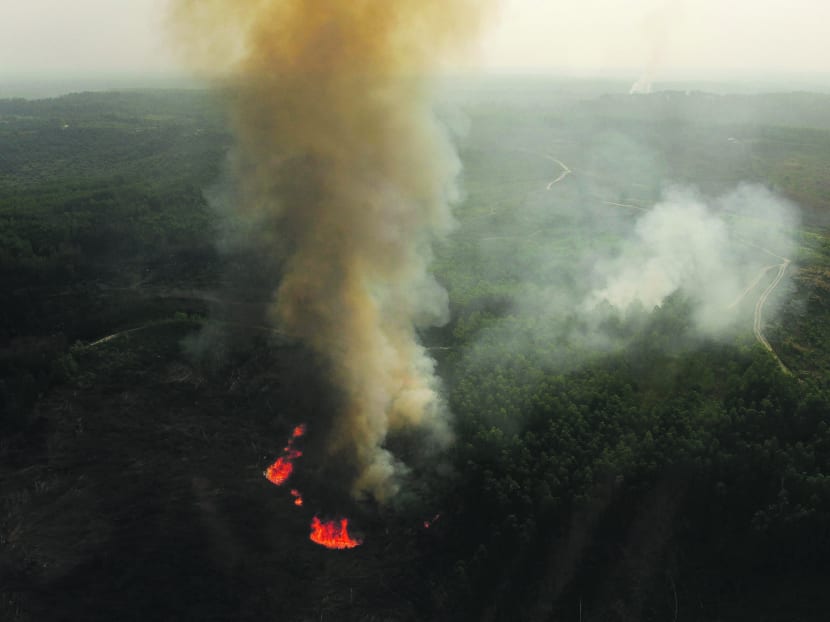Increased fines for companies that cause unhealthy levels of haze proposed
SINGAPORE — The Government has proposed stiffer fines of up to S$2 million for companies that cause unhealthy levels of haze, following feedback that the suggested fines were too low.

An aerial view of burning trees is seen during the haze in Indonesia's Riau province June 28, 2013. Photo: Reuters
SINGAPORE — The Government has proposed stiffer fines of up to S$2 million for companies that cause unhealthy levels of haze, following feedback that the suggested fines were too low.
Under proposed laws on transboundary haze pollution that were introduced in Parliament yesterday, a firm can be fined up to S$100,000 a day for every day of haze that blankets Singapore — for a continuous period of 24 hours or more — at about the same time as the company’s haze-causing activities.
Also, companies that fail to comply with preventive measures during the haze episode could be fined up to an additional S$50,000 each day. The maximum penalty for each of the offences is capped at S$2 million.
Amendments to the draft legislation were made following a month-long public consultation earlier this year, where respondents noted that the proposed fines were too low. The Government had initially proposed that errant companies be fined up to S$300,000 if they were found to have caused or contributed to haze, or up to S$450,000 if they deliberately ignored requests to prevent, reduce or control the haze.
Some who provided feedback on the draft bill also felt that non-land-owning entities — who have agreements such as leases and licences with landowners — should also be held responsible for contributing to transboundary haze.
Hence, the Government is proposing an “owner” be defined as any person who holds a valid lease, licence or permit to carry out farming or forestry operations, or one who has an arrangement with the land owner to do so. These entities can also be held accountable for causing transboundary haze.
Speaking to reporters last Friday, Minister for the Environment and Water Resources Vivian Balakrishnan said the penalties have been increased to send an “unequivocal signal” to deter companies from engaging in irresponsible behaviour.
But he also reiterated that proving parties are responsible for transboundary haze will be a challenge, and the Bill cannot act in isolation. “This is an ASEAN problem. We need effective collaboration, cooperation between governments. We need to share information, we need to share results of investigations,” he said.
To make enforcement more effective, officers will be empowered to serve a notice in writing to obtain certain documents and information that are relevant to investigations and prosecution. The court can also require persons to remain in the country to ensure that the parties comply with the notice.
The Bill — which also allows for civil action for losses due to haze — tabled yesterday does not stipulate the prescribed level of haze Singapore has to experience before companies or other entities are found to have committed an offence. This is expected to be addressed in the second reading of the Bill. A MEWR spokesperson said the “unhealthy level” of haze will be determined based on the current Pollutant Standards Index framework.
Air pollutants and climate change expert Assistant Professor Jason Blake Cohen of the National University of Singapore welcomed the stiffer proposed penalties, noting that companies would choose the “polluting way” if penalties on environmentally-related issues were too low.
But he added that the causes and timeline on when the land has been burned are also issues that need to be considered, especially in instances where a company steps in to use the land only after the land has been cleared and is not held responsible for causing transboundary haze.









